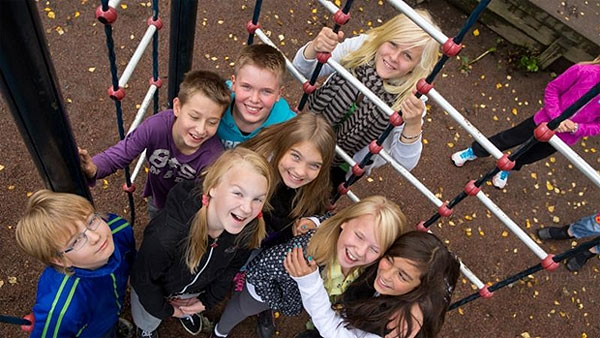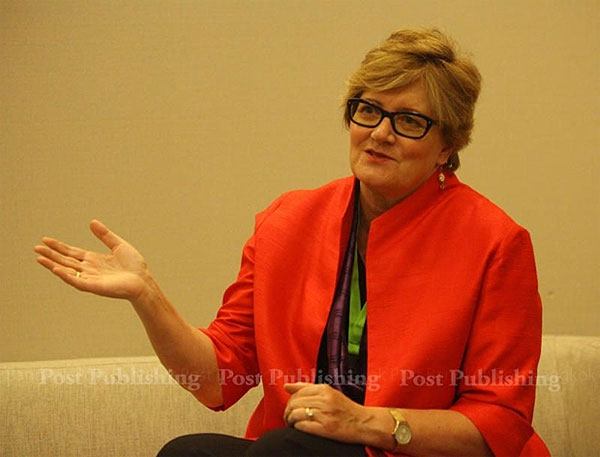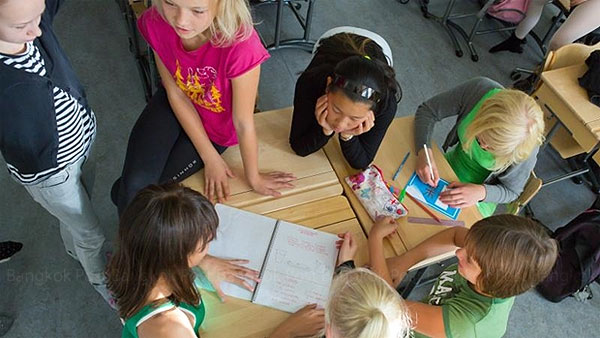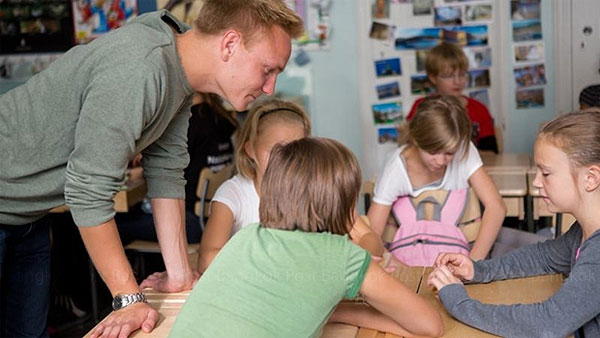
Children at a school playground in Finland. Photo courtesy of Agate PR
By Terry Fredrickson
Finland, a country without oil, gas or diamonds, has since 1968 focused on its most precious resource: human capital. It's educational system produces some of the best students in the world. But how? Are there lessons for Thailand?
Here are excerpts from a conversation with Ambassador of Finland Kirsti Westphalen on her country's commitment to education in the Life section of today's Bangkok Post. The full story is well worth reading and you can find it here: http://www.bangkokpost.com/lifestyle/social-and-lifestyle/439998/finland-world-beating-education-systemoffers-lessons-for-thailand Finland's World-beating education system offers lessons for Thailand.
Please join us on our Facebook page http://www.facebook.com/bangkokpostlearning
Click button to listen rightclick to download
Pimrapee Thungkasemvathana

Ambassador of Finland Kirsti Westphalen. TAWATCHAI KHEMGUMNERD
What is the Finland educational model like?
It is different from the Asian school model, like those of South Korea and China, which pushes children very hard — lots of school work, long days, lots of mental pressure to do very well. We do not do testing. Our school days are shorter. We give very little homework and still we do very well. There is a focus on children learning several subjects at the same time in a group setting, with the teacher as a guide. It is much more important to develop 21st century skills where you can co-operate, communicate, be together, and be creative.
The teacher is able to see the strengths and weaknesses of a particular child, constructing an individual learning plan for the child in parent-teacher discussions. You don't compare yourself to others.
What brought about the educational reform in 1968?
Finland was in a situation not dissimilar to Thailand of today. Politically, Finland was very divided. The political ideologies were very far apart, but the leaders were able to come together and decided that Finland, as a country far away up in the north, has to show that we are capable, or else no one is going to ask after us.
We neither have oil nor gas nor diamonds. What we have is human capital. It was decided that the way to make small, little Finland, with only 5.3 million people, successful in the global arena, is to develop our education system. We are very fortunate that this momentum has been maintained [for 40 years]. To reform education takes a generation. It takes a long time to bring about changes that you can see.

In the Finnish classroom, students may learn several subjects at the same time in a group setting, with the teacher as a guide. They learn to co-operate, communicate, be together, and be creative. /Agate PR
So how did Finland go about it?
It's important that whatever one does in the area of education is based on facts, that you don't throw good money after bad money. Thailand uses a huge share of its own GDP in education. It is larger than what is used in Germany. You would think that money as such would give results, but that's not necessarily the case. So it's very important to truly study what gives results and what doesn't.
In Finland, we try to approach education in a very scientific manner. The one thing that has been giving results is that we've invested in teachers. For a country, nothing is more important than its own children. Nothing is more important to the children than their own parents and families, but next to that, it certainly is the teachers. Investing in professional training for teaching education, so that even kindergarten teachers have a master's degree, is worthwhile.
The profession of a teacher is highly valued in Finland. You become either a doctor, a lawyer or a teacher. They don't make quite the same money as doctors and lawyers, but they make good money. And it is very difficult. Only one out of 10 gets into teacher training because it is such an esteemed profession. If one values the performance then the pay should reflect that.
What is the main lesson Thailand could learn from Finland?
Thailand should move ahead wisely with policies that have been tested and have produced results, before launching this way and then that way. You could do that in fashion. Fashion changes every few months. You cannot do that in education if you wish to have sustainable results.

Finland has invested heavily in teachers, making the profession one of the country's most attractive choices for young people. /Agate PR
Vocabulary
ambassador: a senior official who lives in a foreign country and represents his or her own country there - เอกอัครราชทูต
approach: to deal with a situation or problem in a particular way - ปฎิบัติต่อ, จัดการ
arena: an area of activity that concerns the public, especially one where there is a lot of opposition between different groups or countries - เวที
attractive: having features or qualities that make something seem interesting and worth having - น่าดึงดูด
capable: able to do something; very good at a job - มีความสามารถ
century: a period of one hundred years - ศตวรรษ
co-operate: to work with other people to achieve a result that is good for everyone involved - ร่วมมือกัน
commitment: willing to give your time and energy to something that you believe in; a promise or firm decision to do something - การให้คำมั่นสัญญา, การให้คำมั่น, การมอบความไว้วางใจ
construct: to build or make something, especially buildings, bridges, etc. - สร้าง
creative: involving a lot of imagination and new ideas - ซึ่งมีความคิดริเริ่ม, ซึ่งมีความคิดสร้างสรรค์
dissimilar: different from someone or something else - ซึ่งไม่เหมือนกัน
divided: split by disagreements or different opinions - มีความเห็นที่แตกต่างกัน, แบ่งแยก
esteemed: highly admired and respected - ซึ่งได้รับการยกย่อง, น่าเคารพ, น่านับถือ
excerpt: a part of a longer story, speech, song, text, etc. - บทคัดย่อ
fashion: the newest clothes designed by fashion designers - เครื่องแต่งกายสมัยนิยม, แฟชั่น
focus: the thing or person that people are most interested in - จุดสนใจ, จุดสำคัญ, จุดหลัก
fortunate: lucky - โชคดี, เคราะห์ดี
GDP: gross domestic product, the total value of all goods and services produced in a country in a year, except for income received from money invested in other countries ผลิตภัณฑ์มวลรวมภายในประเทศ -
generation: a group of people in society who are born and live around the same time - รุ่น (คนรุ่นต่างๆ)
global: throughout the world - ทั่วโลก
guide: someone who helps you to decide what to do by giving you advice or by giving you a good example to follow - ผู้ชี้ทาง, ผู้นำร่อง, ไกด์
human capital: the people working for an organisation or a country and their accumulated skill, experience and knowledge - ทรัพยากรมนุษย์, ทุนมนุษย์ ความรู้และความชำนาญที่อยู่ในตัวบุคคลที่เป็น กำลังแรงงานของประเทศ การลงทุนมนุษย์ จะช่วยเพิ่มประสิทธิภาพในการผลิตของแรงงาน เช่นเดียวกับการลงทุนในเครื่องจักรกล การลงทุนในทุนมนุษย์ด้วยการศึกษาแลฝึกอบรมนับเป็นการพัฒนาทุนมนุษย์ที่สำคัญ มากต่อการพัฒนาเศรษฐกิจของประเทศสหรัฐอเมริกาจัดเป็นประเทศที่ให้ความสำคัญ กับการพัฒนาทุนมนุษย์มาก จากการศึกษาวิจัยในสหรัฐอเมริกาพบว่าการลงทุนในทรัพยากรมนุษย์ จะส่งผลต่อการเจริญเติบโตทางเศรษฐกิจของสหรัฐอเมริกามากกว่า การลงทุนที่ใช้จ่ายไปโดยตรงในการซื้อโรงงานและเครื่องมืออุปกรณ์เพื่อการ ผลิต [สิ่งแวดล้อม]
ideology: system of ideas and principles on which a political or economic theory is based - แนวคิดอันเป็นรากฐานของสังคม เศรษฐกิจและการเมือง
individual: relating to or involving a single, separate person or thing - แต่ละบุคคล
invest: to spend money on something in order to make it better or more successful - ลงทุน
kindergarten: a school for children, usually between the ages of two and five - โรงเรียนอนุบาล
launch: to start something - เริ่มต้น, เปิดโครงการ, เริ่มทำ
lawyer: an attorney - ทนาย
maintain: to keep - รักษา
manner: way - วิธีการ
master's degree: a further university degree that you study for after a first degree - ระดับปริญญาโท
mental: connected with or happening in the mind; involving the process of thinking - เกี่ยวกับจิตใจ
momentum: progress or development that is becoming faster or stronger - แรงผลักดัน, แรงกระตุ้น
not necessarily: possibly true but not definitely or always true -
particular: specific - เฉพาะ, จำเพาะ, โดยเฉพาะ
pressure: a worried feeling that you get when you have to deal with a difficult or complicated situation - ความกดดัน
profession: a type of job that needs special training or skill, especially one that needs a high level of education - อาชีพ
professional: relating to a particular type of job or career and its rules, standards, and arrangements - เกี่ยวกับอาชีพ
reflect: to show - สะท้อน แสดงถึง
reform: to make a change that is intended to correct a situation that is wrong or unfair - แก้ไข ปฏิรูป
setting: the place where someone or something is, and all the things, people, or emotions that are part of that place - สภาพแวดล้อม,
share: one part of something that is divided between two or more people - ส่วน
situation: all the circumstances and things that are happening at a particular time and in a particular place - สถานการณ์
skill: the ability to do something well, usually as a result of experience and training - ฝีมือ, ทักษะ
sustainable: able to be successfully continued for a long time - ยั่งยืน, ถาวร
truly: in the most complete, correct, or exact way - อย่างแท้จริง
value: to think that somebody/something is important - ให้ความสำคัญ
wisely: making good choices and decisions - อย่างฉลาด, อย่างรอบรู้, อย่างมีสติปัญญา
worthwhile: useful, important or good enough to be a suitable reward for the money or time spent or the effort made - คุ้มค่ากับความพยายาม


